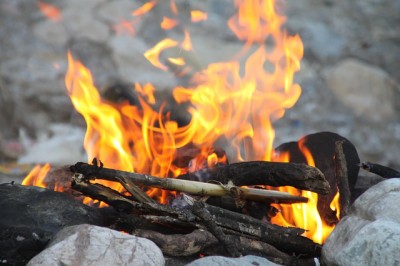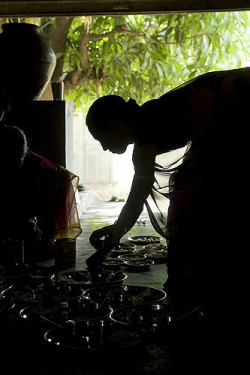by Himangshu Dutta
Now when I think of my childhood living in the foothills of Kamakhya in Guwahati, my mind takes me back to one particular December from decades ago, when the mornings were unreasonably cold from untimely showers, and when before I got up to pee, I would hide my face under my blanket, which was warm and dark enough to daydream for a while. This December was special because it was our last spent among the hills; the next May we had relocated to the heat and dust of Delhi, and our winters were never the same again.
That December, I had just started sleeping alone in my room. In this room, there was a window which looked out at the surrounding hills. Some mornings when I woke up early, I would crawl onto the windowsill and look at these hills. I would picture myself standing on top of one such hill. I would imagine a cool blanket of mist enveloping me, with fresh streams of water rolling down the cracks and gaps in stoned earth just inches from where I stood, each racing the other to the river below. I would imagine looking at the tender rays of morning glistening on the bursting bubbles on these streams. In the plains, I would picture the mornings to be a rush of activity, with entire neighbourhoods getting ready for another day at work. Often though, my daydreams would be cut short by my mother’s insistent shouts, “Don’t you have school today?” But some mornings, there would be no school. On such mornings if I woke up early, I would stride outside to our front yard, and see the steam rise and leak from under the tall eaves of our kitchen, its white smoke giving up thousand of particulates which would then get caught unevenly by the soft sunlight and scattered all over the neighbourhood. Then in no time I would see latches getting opened; plants getting watered; and granny waking up on her bed, her lips moving gently in prayer.
In the evenings – I remember – often the rains would start. And parts of the river, which had gone up to stay in the skies, came hurtling down. From the ground beneath, hot air rose and green leaves turned greener. And the rumbling fury of scudding clouds brought with it a breath of moist freshness and the smell of wet earth. Water-puddles formed everywhere; steel buckets were hurriedly placed under leaking roofs, with the sound of the constant drip-drop audible from far. Flocks of birds cried from neighbouring tree branches, calling upon their brethren to return home, and dogs shrieked from under rain-damaged sheds. The smell of hot boiling tea and roasted nuts seeped in through locked doors and open hearts. Then there were paper-boats dancing upon water puddles, soggy and worn from incessant drops, and deep footmarks cast in loose mud and in lasting memory, soon to be filled with gushing water. Tired neighbours returned home, their faces hidden under large, black umbrellas, with their rubber soled sandals urgently slapping the unrelenting mud on the lone muddy streets of our neighbourhood.
It is for one such evening that I care so much now. That evening the rains had started early but then had trickled down to nothing, like an actor who starts speaking, only to realise he has mistimed his cue. Dad had brought home a few logs of dry wood, and Ma got busy lighting them up in our front yard. It had been a while since we had had such bonfires in our front yard. So granny, putting on her glasses, wondered why. Dad said why not.
Then the entire family huddled together around it. I lay with my head on Ma’s lap. Granny sat beside, with the family album in her hands, and Dad sat nearby, puffing away at his cigarette. Every now and then, he would rise and add logs into the fire. Granny hummed an old folksong, of which some lines she couldn’t remember. So Ma chipped in to complete the song and started giggling. I looked up and in the bright light, saw her cheeks turn pink. Then granny and Ma went on to sing many more songs. Dad just sat there, like a peaceful monk, and kept puffing away quietly. Occasionally, he too would pitch in with the women and join them in some song. But, mostly he kept to himself, uttering a contented “hmm” each time granny picked up on a long-forgotten song from his childhood. Fascinated, I traced the path of the grey smoke coming out in circles from his mouth, going round and round till it became one with the smoke from the fire. How I wished time would stop in that instant. As I watched the red glowing embers rise and move towards the sky, a thought came to my mind: “I need never fear the dark again. I need never go looking for love elsewhere. I should know that I am safe, safe because Ma is there to look after me. Dad, my hero, he will always be there, no matter how much I might trouble him sometimes. And granny, no matter how old she got, would always have bedtime stories of kings and queens to tell. And time would stop moving forward, like the timeless faces of happy picnic-goers, trapped inside a Polaroid shot for an eternity.”
Now when I look back, the memory of that distant night, with the lingering image of our small family huddled together, feels so much like a moment stolen from heaven. It is a wonder how time flies. It’s like staring down the hour hand of a wall-clock – seems like an eternity, but then you blink, and all those minutes of your childhood just pass, never to come back again.






